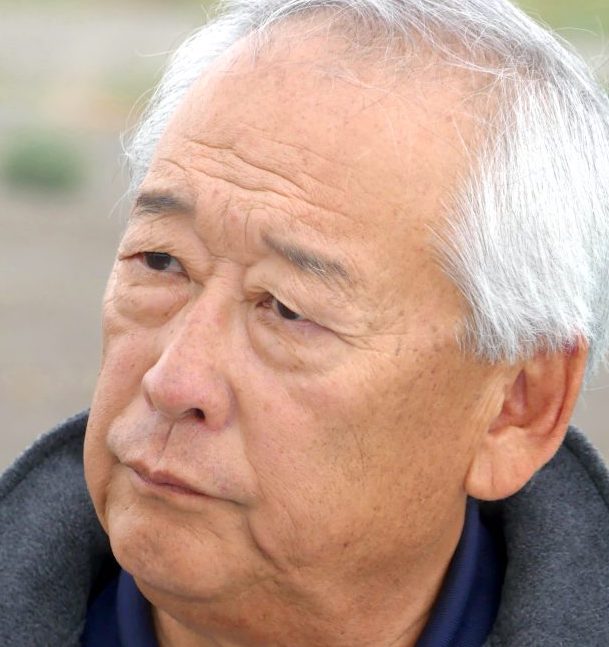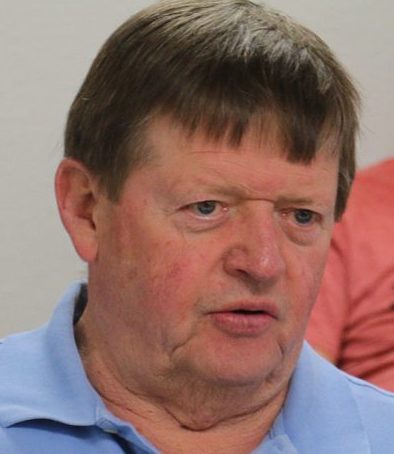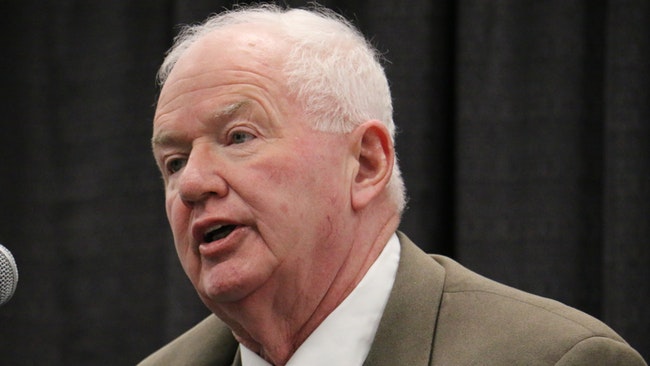Project leaders have incurred costs for the Treasure Valley Reload Center that leave them with just $5,612 of their $25.6 million state grant while the project remains far from done, according to documents released recently to the Enterprise.
They face another $1 million in contractor claims the state grant was intended to cover. How project managers will now pay those couldn’t be established.
The records also reveal that the Oregon Department of Transportation last month suspended paying project bills, awaiting revisions to its contract with Malheur County Development Corp. that expired in October. Meantime, borrowing costs for the reload center that are paid by the county are escalating.
The revelations came after construction crews packed up and left in December, their work disrupted because there was no money to pay them to keep going.
The warehouse sits in pieces on the ground, awaiting a foundation and assembly.
One rail spur for now ends short of the warehouse that it is supposed to serve, incomplete because there is no building to connect with.
And roads to carry thousands of onion-loaded trucks are dirt and some rock, inadequate for carrying heavy vehicles.
Month by month, project leaders have revised their construction schedules, delaying work again and again as they sort out the money issues.
The project began as an idea in 2015 to find a way to get more local onions on trains for shipment to East Coast markets. The Legislature funded the reload center in 2017 and county officials sought formal state approval the following year, saying the facility could be built by 2020.
Because of delays in getting permits and contract issues, construction didn’t start until December 2021 but even than project leaders were concerned whether they now had enough money to build all that was planned.
In the past year, the development, a creation of Malheur County government, obtained new commitments for extra money. The company is still working to finish one contract to get the extra $3 million awarded by legislators four months ago or another contract to get $2 million awarded by Malheur County.
But even with those sums, the development company doesn’t have enough money – estimated at $7 million – to finish the reload center.
And the public documents released last week indicate that the development a team now has a new $1 million headache for a public project that was to have been finished by now and at far less cost. What a year ago project officials last year insisted would be a $26 million center now is approaching $40 million, based on available records.
Those responsible for the project won’t comment.

Greg Smith is the contractor managing the project, costing the county $9,000 a month. He also holds a seat on the development corporation board. He didn’t respond last week to telephone messages seeking an interview or to detailed questions about the project’s finances and his actions.
The five other board members of Malheur County Development Corp. didn’t respond to detailed written questions about the finances and their own roles.
Malheur County Judge Dan Joyce wouldn’t discuss the project either.
“I’m not going to answer any questions about the reload while we are in the lawsuit,” he said.
He referred to the pending suit against the county and the development company by the Enterprise seeking compliance with the state’s public records law.
Malheur County Commissioner Ron Jacobs, the liaison between the Malheur County Court and the project, didn’t respond to an interview request and didn’t answer written questions about specific financial issues.
“I do not possess the exact figures,” Jacobs said in an email on Friday, Feb. 3, noting he expected to get them soon.
He took the same position two weeks earlier in a Jan. 23 email when questioned about the reload center’s finances.
“Until I receive a more detailed report about the shortfall, I don’t feel that I can comment on the specific numbers,” he wrote to the Enterprise.
“You shouldn’t have to create a budget or schedule from scratch. You download the latest version from your computer. Project management 101.”
– Mike Walker, Adrian farmer
He was counting on a Jan. 26 development company board meeting to provide such details. But Smith abruptly ended that meeting, providing no financial information, and saying he needed more time to pull together budget information.
No project cost information has been shared at board meetings since October.
Mike Walker, an Adrian farmer once considered for a seat on the development company board, said in a Facebook post, “A project manager – who by the way is being paid $9000 per month – cancels the bulk of a board meeting because he didn’t put in the effort to prepare for the meeting. This doesn’t happen in any other board of directors, it’s a major management failure.”
He added, “You shouldn’t have to create a budget or schedule from scratch. You download the latest version from your computer. Project management 101.”
Jacobs said last week he didn’t believe people responsible for the reload center were deliberately hiding information from the community.
“I would never condone nor do I suspect any conspiracy of silence meant to rob the people of Malheur County of the facts,” Jacobs said.
But the records show Treasure Valley Reload Center, built in part on a marshy wetland, is sinking further into financial trouble in a way not previously disclosed. The lack of money is delaying more construction even as Smith tries to organize onion growers for a meeting to see who will use the center.
Smith and his team started the project in 2018 with a $25.6 million state grant meant to pay for it all. The state has held the money, paying it out as invoices came in from work completed. Project leaders say the state grant was for $26 million, neglecting to account for $376,000 that will be kept out of that sum to pay the state’s oversight costs.
By early January, records show, the development company itself calculated that it had $1 million left in its grant – and a stack of unpaid invoices that would consume that.
Development company records show recent invoices from R6 Contracting for $649,370, RailWorks for $298,292 and Anderson Perry for $51,505.
Once those are covered by the state, the development company will have $5,612 left in its original grant.
That means other contractor costs known to Smith and his team will come due with no means to use the state grant to pay them.
R6 Contracting and RailWorks are owed $720,369 for what is called “retainage.” That’s the construction practice for owners to keep a share of each payment to ensure contractors properly complete their work. The retainage is typically paid when all work is done.
Besides its retainage, RailWorks is in line for another $330,762 once it finishes a rail spur serving the warehouse.
Those costs exceed the state grant by $1.045 million.
But even the last $1 million in the grant can’t flow until Malheur County Development Corp. fixes its contract with the state.
That legal document controls how and when the state’s $25.6 million is doled out to the development company. Like a carton of milk, the contract had an expiration date – Oct. 31, 2022.
By law, the state can’t pay for any work done on the reload center after that date. Amending the contract to put in a new expiration date would fix that.
But no fix is in place yet.
As a result, ODOT stopped disbursements until it is.
Smith was notified of that in early January.
Records show that the development company on Jan. 4 sent to the Oregon Department of Transportation a claim for $711,978 to cover contractor costs. In the past, state officials would review the documentation, approve it and then reimburse the development company.
That didn’t happen this time.
“ODOT is denying payment,” according to the Jan. 5 email the development company because invoices were for work “outside the agreement expiration date (10/31/22).”
Smith’s response to that news couldn’t be established.
Seven days after the state notification, the development company board convened.
Smith reported to the board member about his visit to the rail site.
“It’s pretty magnificent,” he told the directors.
He mentioned conversations with state about the contract and “the need to update ODOT on our progress.”
He did not tell the directors the state had stopped payments.








Those responsible for the Treasure Valley Reload Center didn’t respond to detailed written questions provided by the Enterprise last week concerning project finances and the project manager’s truthfulness.
PREVIOUS COVERAGE:
State’s fund for rail center nearly exhausted but millions in costs remain, records show
Rail meeting canceled after officials meet with attorneys regarding newspaper lawsuit
Rail reload center manager says cash woes may slow progress on project
Findley uncertain of seeking more state money for rail project while Owens stays silent
Contact Editor Les Zaitz: [email protected].
HOW TO SUBSCRIBE – The Malheur Enterprise delivers quality local journalism – fair and accurate. You can read it any hour, any day with a digital subscription. Read it on your phone, your Tablet, your home computer. Click subscribe – $7.50 a month.




